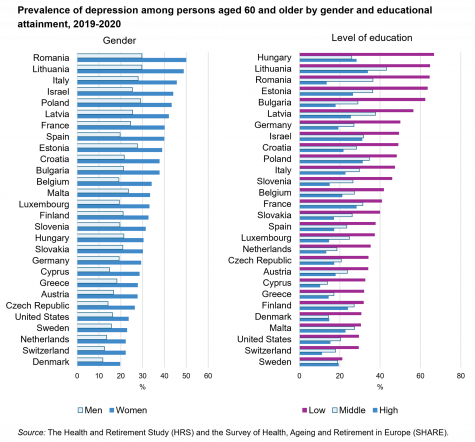
In many countries in Europe, North America and Central Asia, more than one in four older persons is affected by depression. Later life brings transitions such as retirement, bereavement, chronic illness, and changes to living arrangements and caregiving responsibilities that can increase stress, anxiety, and loneliness. Yet the mental health of older persons is often overlooked. Symptoms among older persons are frequently discounted due to physical or cognitive limitations including dementia or dismissed as a normal part of ageing. Mental-health related stigma, which is more prevalent among older generations, as well as ageism create additional barriers to accessing and receiving adequate care.
Mental health is a cornerstone of individual well-being and is recognized as a basic human right in the Universal Declaration of Human Rights. All older persons have the right to be protected from factors that harm their mental well-being and to access high-quality and culturally appropriate mental health care services.
The latest UNECE Policy Brief on Ageing on Mental Health of Older Persons sheds light on the complex challenges related to mental health of older persons in the region and presents different policy strategies applied across UNECE member States to promote, protect and care for the mental health of older persons.
Intersecting determinants
The policy brief outlines the individual, social, and environmental determinants that intersect to influence the mental health of older persons. While genetic factors and experiences throughout the life course often play a role, multiple and concurrent challenges during later life can place extra strain on mental health. Declining physical health or mobility limitations may reduce older persons’ ability to engage in activities they enjoy and restrict their social interactions. Experiencing the cognitive or physical decline or death of friends and family members can lead to feelings of loneliness and depression. Social and environmental factors such as socio-economic status, social connections, access to mental health care, physical environments, and experiences of ageism further contribute to mental health outcomes. Understanding these determinants across different domains is important for designing effective policies that support mental health in later life.
Women, less educated persons, and the “oldest old” most affected by depression
The prevalence of depression among those aged 60 and older is between 20 and 35 per cent in most countries in the region. The brief highlights striking differences by gender, age, and level of education. Depression rates are significantly higher among older women than older men. In some countries like Cyprus, Czech Republic, and Spain, older women are more than twice as likely to be affected by depression than older men. Depression is more prevalent among older persons with lower levels of education compared to those who have completed third-level education. When it comes to age, the situation is concerning: among those aged 60 and older, depression increases with age with rates among those aged 80 and older exceeding 50 per cent in some countries.

Countries take action
Several countries in the region have recently developed comprehensive action plans for mental health that recognize the particular challenges faced by older persons. In Spain, for example, the Mental Health Action Plan for 2022-2024 aims to establish mechanisms for identifying vulnerable older persons with mental health challenges especially those living alone. Programmes targeted at combatting stigma and improving mental health literacy aim to overcome barriers to diagnosis and treatment. Age UK’s “Your Mind Matters” campaign seeks to counter common myths and misconceptions about the mental health of older persons. Other strategies focus on prevention and early detection including community-based interventions aimed at addressing risk factors. In the Netherlands the “One Against Loneliness” programme has been implemented to reduce loneliness. Initially targeted at older persons, its success has led to expansion to individuals of all ages.
Strategies to improve access to effective mental health services for older persons include the integration of mental health services into primary healthcare, specialized training for health care professionals to ensure competent and compassionate care for older persons, the expansion of telehealth services, and provision of talk therapy and counselling services. In Slovakia, for example, new family counselling centres provide free services to strengthen family relationships and intergenerational communication.
The brief details the variety of approaches being employed by countries in the region in these and other areas, including mental health support for caregivers and older workers, in long-term care settings and in emergency contexts.
A comprehensive approach for a complex challenge
The policy brief calls for a comprehensive response requiring collaboration of diverse stakeholders, including governments, civil society organizations, academia and older persons themselves. Incorporating the perspectives of older persons ensures that policies and services are inclusive and effectively address their needs. The brief recommends several targeted strategies including public awareness campaigns, the integration of mental health services into primary and long-term care models, training of health care professionals in geriatric mental health care, specialized services for older person including for life events such as bereavement and strengthening the evidence base through data collection and research.
Safeguarding the mental well-being of older persons supports their human rights and aligns with the 2030 Agenda for Sustainable Development. Cross-cutting and inclusive mental health policies can address social inequalities and promote good mental health and dignified lives for all older person.
Read more
UNECE Policy Brief on Ageing No. 29 "Mental health of older persons": https://unece.org/population/publications/mental-health-older-persons
UNECE Policy Brief on Ageing series: https://unece.org/policy-briefs

